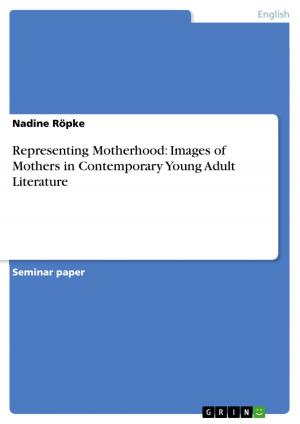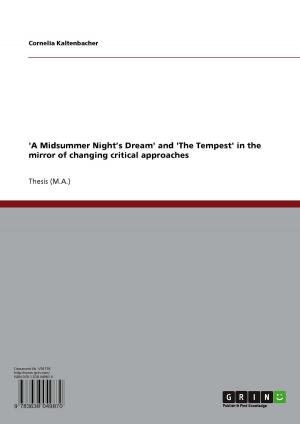| Author: | Robert Scheutz | ISBN: | 9783638200752 |
| Publisher: | GRIN Publishing | Publication: | June 20, 2003 |
| Imprint: | GRIN Publishing | Language: | English |
| Author: | Robert Scheutz |
| ISBN: | 9783638200752 |
| Publisher: | GRIN Publishing |
| Publication: | June 20, 2003 |
| Imprint: | GRIN Publishing |
| Language: | English |
Seminar paper from the year 2003 in the subject English Language and Literature Studies - Linguistics, grade: 3 (C), University of Graz (Humanities Faculty), course: Introduction to English Linguistics, 18 entries in the bibliography, language: English, abstract: Language and words as its basis are tools to communicate meaning. Language is the key to successful cultural and social living which depends on exchanging (encoding and decoding) meaning. Therefore new words are assigned to refer to new meanings. New words and especially coinages (invented, totally new terms) appear in the emerging fields of society: in the televised contemporary history, in (counter)culture, in advanced technology and even in daily smalltalk. 'McJob', 'artsy', 'daisy-cutter', 'MIDI', 'emoticon', 'carjacking' or 'cyberspace' to name just a view recent examples, show the great variety of new words. Due to the complexity and the on-going developments this paper makes no demand to giving a complete description. The attempt is to analyse basic concepts and further to sketch relevant areas of neologisms (dictionary-approved new words). 1 Definitions In order to the major question of this paper, it's important to define clearly what 'new words' are - 'a new word is a form or the use of a form not recorded in general dictionaries'. (Algeo 1991: 2) The crucial condition for the inclusion in dictionaries is frequent usage. A dictionary which is a source of neologisms is the Oxford Dictionary of New Words. The editor, S. Tulloch defines a condition: '[...] whether or not the general public was made aware of [...] a new word is any word, phrase, or meaning that came into popular use in English or enjoyed a vogue during the eighties and [...] nineties.' (Tulloch. ODNW 1991: v) The lexiographical procedure seems to be quite important in defining neologisms. An example by D. Crystal gets things straight (cf. Crystal 1995: 132). As mentioned in the introduction the basic purpose of new words is to fill representational gaps new meanings or new mental concepts open. One type of new word is nonce words (from the 16th century phrase 'for the nonce', meaning 'for the once') which are produced to solve communication difficulties: Somone who wants to describe excess water on a road uses the word fuddle - meaning something bigger than a puddle but smaller than a flood. [...]
Seminar paper from the year 2003 in the subject English Language and Literature Studies - Linguistics, grade: 3 (C), University of Graz (Humanities Faculty), course: Introduction to English Linguistics, 18 entries in the bibliography, language: English, abstract: Language and words as its basis are tools to communicate meaning. Language is the key to successful cultural and social living which depends on exchanging (encoding and decoding) meaning. Therefore new words are assigned to refer to new meanings. New words and especially coinages (invented, totally new terms) appear in the emerging fields of society: in the televised contemporary history, in (counter)culture, in advanced technology and even in daily smalltalk. 'McJob', 'artsy', 'daisy-cutter', 'MIDI', 'emoticon', 'carjacking' or 'cyberspace' to name just a view recent examples, show the great variety of new words. Due to the complexity and the on-going developments this paper makes no demand to giving a complete description. The attempt is to analyse basic concepts and further to sketch relevant areas of neologisms (dictionary-approved new words). 1 Definitions In order to the major question of this paper, it's important to define clearly what 'new words' are - 'a new word is a form or the use of a form not recorded in general dictionaries'. (Algeo 1991: 2) The crucial condition for the inclusion in dictionaries is frequent usage. A dictionary which is a source of neologisms is the Oxford Dictionary of New Words. The editor, S. Tulloch defines a condition: '[...] whether or not the general public was made aware of [...] a new word is any word, phrase, or meaning that came into popular use in English or enjoyed a vogue during the eighties and [...] nineties.' (Tulloch. ODNW 1991: v) The lexiographical procedure seems to be quite important in defining neologisms. An example by D. Crystal gets things straight (cf. Crystal 1995: 132). As mentioned in the introduction the basic purpose of new words is to fill representational gaps new meanings or new mental concepts open. One type of new word is nonce words (from the 16th century phrase 'for the nonce', meaning 'for the once') which are produced to solve communication difficulties: Somone who wants to describe excess water on a road uses the word fuddle - meaning something bigger than a puddle but smaller than a flood. [...]















